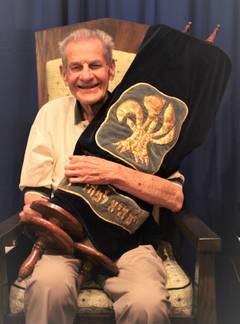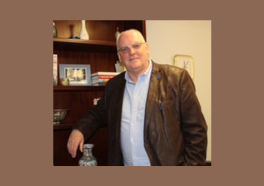- About Us
- Connect
- Learn
- Jewish Life
- Music
- Events
- Give
- Join Us
Life On the Ocean - Kol Nidre 5783/2022
10/07/2022 04:22:36 PM
| Author | |
| Date Added | |
| Automatically create summary | |
| Summary |
Imagine standing on a windy bluff overlooking the Pacific Ocean. Seagulls glide on the wind, and you can watch fishing vessels sail from Newport’s Yaquina harbor out to the open sea.
Sheltered among the shore pines in this Oregon State Park is a small open-air chapel. A few rows of weathered wooden pews face a black granite altar inscribed with the names of fishermen and women who died at sea. The top of the altar is crowded with photographs.
Some of the photographs are old, faded and wrinkled. Some are new, including two labeled “2021,” one of a man and one of a woman. The woman’s face, lined and reddened from the sun and salt air, smiles warmly. The man’s face looks soft and smooth, like he barely graduated from high school.
Visitors to the chapel leave objects by the photos of their loved ones: small rocks, colorful toys, and handwritten notes. The ocean often claims the bodies of those who drown. Family and friends come to the chapel to remember those for whom no gravestone stands in a cemetery.
Anchored under a photo of a bearded man with two small children clinging to him is a note with scribbled handwriting. The note reads: Gus Bus: I miss you brother. Every damn day. Tab and I marry tomorrow. See ya there? Love you, man.
Newport Oregon is a working town, so if you are not interested in visiting the many tourist traps along the bayfront, you can watch the fishermen who go to sea. It is easy to spot them in their bright yellow coveralls and galoshes. They leave their boats and cross the street to fetch cups of coffee. They sit and mend the Dungeness crab traps and the fishing nets. They smoke cigarettes outside the seafood processing plants that line the shore.
Amid all this activity is a Fishermen’s Memorial Walk that follows the contours of the bayfront. Embedded in the Memorial Walk are dozens and dozens of plaques inscribed with the names of those lost at sea, the dates they died, and the names of the fishing vessels on which they perished.
Unlike the chapel in the state park, which is segregated in a quiet spot among the trees, the Memorial Walk at the bayfront winds its way through working fishing areas. Those make their living from the sea have a visible reminder that each time they sail from the harbor, they may not return. Life on the ocean is a life of danger. One day their name may appear on the Memorial Walk. One day their loved ones might visit the chapel in the park and leave a note by their photograph.
What a profound reminder of life’s fragility – a reminder for us as well, as we gather this night of Yom Kippur.
On Yom Kippur afternoon, during the time of day when we are hungry and weary, we read the story of Jonah sailing on the sea. Caught in a storm, sailors cast Jonah overboard to calm the waters. A big fish swallows Jonah, and from the belly of that fish, Jonah prays:
You cast me into the depths,
Into the heart of the sea,
The floods engulfed me;
All Your breakers and billows
Swept over me…
The waters closed in over me,
The deep engulfed me.
Weeds twined around my head…
This ancient poetry reflects the experience of drowning. But Jonah does not drown. The big fish that swallowed him returns him to land for another chance at life. This story of a near death and a second chance at life encapsulates a primary purpose of Yom Kippur.
So much of the Yom Kippur liturgy and traditions focus on the fact of our mortality. We began the service tonight by lighting a memorial candle, and tomorrow we will have yizkor, with music and readings that prompt us to remember our dearest loved ones who have died.
On Yom Kippur it is customary to wear a kittel, a white garment meant to remind us of a burial shroud. When we follow the traditional “fasting” of Yom Kippur, denying ourselves food, water, bathing, leather shoes and lotion, we are treating our bodies like the corpses they will one day become.
Yom Kippur is designed to make us uncomfortable. It reminds us that that whether we work on a fishing vessel riding the ocean waves, or on a computer in a corner office, or at our kitchen table at home – we will not be here forever. Even while we are alive, one day we will each do something for the last time, and we often do not know when that last time will be.
The last time I tucked my son into his bed, I did not realize it was going to be the last time. But children grow older and bedtime routines change, and our kids no longer need us to wish them sweet dreams. The last time I played a game of tennis, I did not realize it was going to be my last time. But the years passed, and I grew busier and older, and when I injured my knee, tennis became off limits for good. And the last time I saw my grandfather, I did not know it was going to be the last time. He enjoyed vitality in his old age, and although he was advanced in years, his death was rather sudden.
Reminding ourselves that everything we do we may be doing for the last time makes the time that we have even sweeter. Imagine doing the dishes after dinner and pondering that this may be the last time you do this chore. Take a breath – and shift your attention to the pleasant sensation of soap bubbles and warm water. Imagine picking up the phone to check on a relative who often fills the conversation with complaints about every little thing. Take a breath – and consider the possibility that this family member may not be alive next week. How will this change your conversation? Imagine tying your shoelaces for your morning run, dreading the sweat and the exertion. Take a breath – and consider that tomorrow you may not be healthy enough to run in the light of a new morning.
Everything we do we will one day do for the last time. Remembering this can transform even the most difficult, boring moments, into something sweeter.
The Memorial Walk on the Newport’s Bayfront reminds fishermen that each time they sail to the open ocean may be their last time. Yet this reminder does not hinder their lives. Quite the contrary. They are living the lives that they choose to live. An inscription on the altar in the memorial chapel reads: I will always be a fisherman. It is not something I do. It is who I am.”
We are all like these fishermen, sailing in vulnerable vessels on the open sea. On Yom Kippur, we are all like Jonah, facing the end of our lives, and then, like a miracle, afforded another chance at life. Life is our greatest treasure, a treasure ever more precious because it is fleeting. Yom Kippur prompts us to ask ourselves: are we living the lives we are meant to live? Are we treasuring the moments that pass away and will not come again? Do we truly understand that every breath can be a new beginning?
Thu, April 24 2025
26 Nisan 5785
Temple israel Happenings
-
Thursday ,
AprApril 24 , 2025 County-Wide Yom HaShoah Commemoration
County-Wide Yom HaShoah Commemoration
Thursday, Apr 24th 12:00pm to 1:00pm
County-Wide Yom HaShoah Commemoration at the Garden of Remembrance, 119 Martine Avenue in White Plains. Temple Israel's rescued Holocaust Torah scroll will be part of the procession of scrolls from Westchester county, and Cantor Hayley Kobilinsky will participate in the program. -
Tuesday ,
AprApril 29 , 2025 Sisterhood Book Group
Sisterhood Book Group
Tuesday, Apr 29th 6:00pm to 8:30pm
NEW DATE! We will be discussing the book "The Frederick Sisters Are Living the Dream" by Jeannie Zusy in person at a congregants' home. The author will be joining us for the discussion. We will have a Pot Luck Dinner to start -
Wednesday ,
AprApril 30 , 2025 Holocaust Education Today: Challenges and Limits by Dr. Werner Steger
Holocaust Education Today: Challenges and Limits by Dr. Werner Steger
Wednesday, Apr 30th 6:00pm to 7:30pm
Dr. Steger serves as the endowed chair for the Greenspan-Handel Trust for Holocaust and Genocide Studies. -
Saturday ,
MayMay 3 , 2025 Midnight Run
Midnight Run
Shabbat, May 3rd 1:00pm to 4:00pm
Volunteers needed. The Midnight Run is a volunteer organization whose goal is to come together as a community in order to feed the homeless of New York City. They coordinate more than 1,000 relief missions per year with volunteers from churches, synagogues, schools and other civic groups to deliver food, clothing, blankets and personal care items to the homeless poor on the streets of New York City.
Events
Today's Calendar
| Yom HaShoah |
: 12:00pm |
: 7:00pm |
Friday Night
: 7:00pm |
Shabbat Day
: 9:30am |
Upcoming Programs & Events
Apr 24 |
Apr 24 |
Apr 29 |
Apr 30 |
May 2 |
This week's Torah portion is Parashat Sh'mini
| Shabbat, Apr 26 |
Yom HaShoah
| Thursday, Apr 24 |




